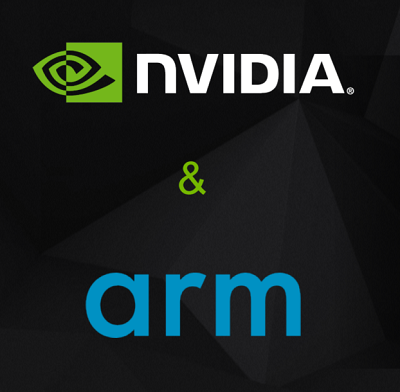As the Top500 list was being announced at ISC in Frankfurt today with an upgraded petascale Arm supercomputer in the top third of the list, Nvidia announced its intention to make Arm a full citizen in the processing architectures it supports, along with x86 and Power. Noting the increased activity and momentum for the alternatives to x86 CPUs, Nvidia declared its backing for Arm, carving out a “new path for extremely energy-efficient, AI-enabled exascale supercomputers.”
Once upon a time, in 2011, Nvidia hatched a project to develop a full-featured Arm CPU capable of powering personal computers, workstations, servers and supercomputers. Project Denver, as it was called, failed to materialize in its original scope, but Nvidia did end up making Arm+GPU chips (Tegra/Xaviar and Jetson), designed for the embedded worlds of mobile, robotics, portable gaming and autonomous vehicles.
 The company has also invested in Arm+GPU software development through PGI, which it owns, and OpenACC, the open source software project that it helps support, but from this reporter’s perspective those plans seemed to be on-again, off-again, or perennially in limbo.
The company has also invested in Arm+GPU software development through PGI, which it owns, and OpenACC, the open source software project that it helps support, but from this reporter’s perspective those plans seemed to be on-again, off-again, or perennially in limbo.
In fact, questions we asked the OpenACC team about Arm support a few days ago were politely deflected just a day before we got the pre-briefing that Nvidia would be recommitting to Arm in a big way. Nvidia exercising caution and pumping the breaks as it did makes sense when you consider Arm-64’s trajectory. The transition from mobile platform to general purpose server CPU has been a bumpy one, with several false starts and setbacks before finding traction — starting in the HPC space. Now Marvell’s Cavium Arm server chips are powering the world’s first Arm petascale supercomputer at Sandia National Labs, Japan’s exascale Arm plan and execution are well under way, and Europe is committed to making a European Arm chip that will power its coming exascale-class machines.
Seeing the enthusiasm and momentum for Arm (HPC market watcher Addison Snell of Intersect360 Research has observed there are more Arm exascale plans in play than there are Intel), Nvidia has decided now is the time to throw its full and substantial weight into Arm support.
Nvidia plans to make its full stack of AI and HPC software — which accelerates more than 600 HPC applications and all AI frameworks — available to the Arm ecosystem by year’s end. “The stack includes all Nvidia CUDA-X AI and HPC libraries, GPU-accelerated AI frameworks and software development tools such as PGI compilers with OpenACC support and profilers,” says Nvidia.
“We’ve been working on this for the last two years, porting our platform and compiling it over, testing it out. We’re almost there, and for us it really wasn’t a question of if, but when,” said Ian Buck, general manager and vice president of accelerated computing at Nvidia,
“By marrying Arm and GPUs together, we can offer energy efficient supercomputing by taking all the heavy lifting of the computation – whether that means simulation flops or AI – and offload those portions of the computation while the CPU can focus on what it’s great at, which is fast single-threaded execution,” Buck added.
The launch today came with strong ecosystem support and over a dozen testimonials, from execs at Ampere Computing, Atos, CSC, HPE, Jülich Supercomputing Center, Marvell, Mellanox Technologies and others (below).
Support came in from partner Cray, which is invested in Arm compiler development. “At Cray our vision for the exascale era is systems that integrate AI and analytics with modeling and simulation, systems that enable and often require a diversity of processor architectures and systems that are built for data-intensive workloads required in science, engineering and digital transformation,” said Peter Ungaro, president and CEO, Cray. “We are excited to partner with Nvidia to help realize this vision in our supercomputers by leveraging their CUDA and CUDA-X HPC and AI software stack to the Arm platform and integrating it closely with our Cray system management and programming environment (compilers, libraries and tools) already enabled to support Arm processors across our XC and future Shasta supercomputers.”
EuroHPC is exploring Arm’s potential as an engine for its coming exascale systems. The European Processor Initiative roadmap, announced at the EuroHPC Summit Week in May, includes several generations of Made-in-Europe CPUs based on ARM with an acceleration thrust as well.
“The European Processor Initiative aims to endow the European Union with its own high-end, low-power, general purpose and accelerator solutions. EPI and SiPearl, its industrial hand, consider very positively the new possibilities offered by Nvidia. The combination between the EPI Arm-based microprocessor and Nvidia accelerator could make a perfect match for equipping building blocks in the future European exascale modular supercomputers,” said Philippe Notton, general manager at EPI.
Japan’s RIKEN research institute, which is pinning its exascale strategy on custom-designed Fujitsu Arm chips, also not surprisingly is backing the effort. “We have been a pioneer in using Nvidia GPUs on large-scale supercomputers for the last decade, including Japan’s most powerful ABCI supercomputer,” said Satoshi Matsuoka, director, RIKEN Center for Computational Sciences (R-CCS) and professor, Tokyo Institute of Technology “At Riken R-CCS, we are currently developing the next-generation, Arm-based, exascale Fugaku supercomputer and are thrilled to hear that Nvidia’s GPU acceleration platform will soon be available for Arm-based systems.”





























































